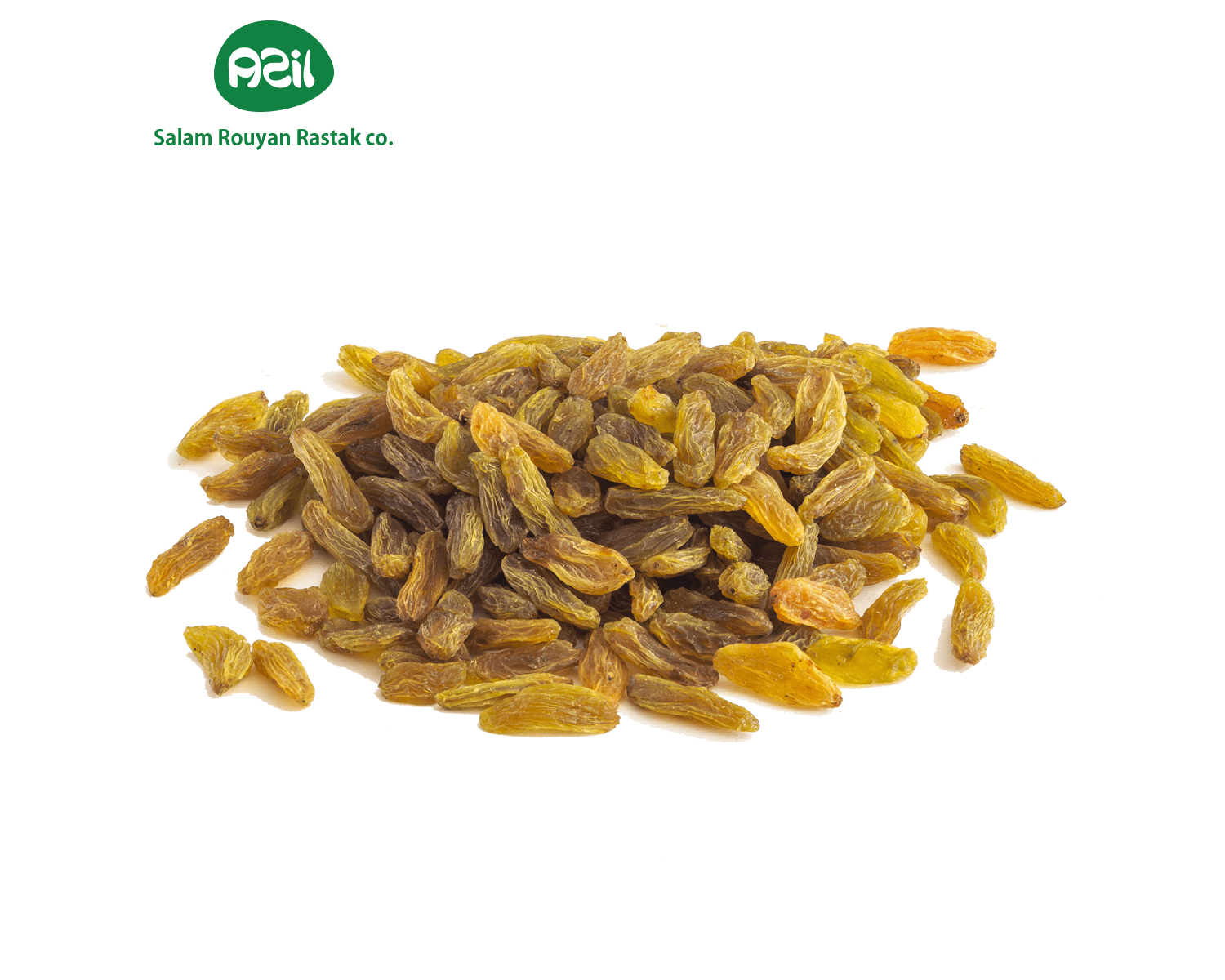Persian Raisins
Persian raisins, with their deep sweetness, bring joy to Iran’s family gatherings. Known as “keshmesh,” these dried grapes are a beloved treat during intimate celebrations. For example, families share them during Shab-e Chelleh to sweeten the longest night. This article explores how Persian raisins enhance family traditions, their cultural value, and their health benefits. We’ll also dive into their production, preparation, and global appeal. As exporters of saffron, nuts, and more, we share Iran’s finest keshmesh too. So, discover why these dried grapes are a gathering essential, how they’re used in Persian homes, and why they’re cherished worldwide. Join us to explore this sweet delight and see what makes it a Persian family treasure!
Introduction

Azil Organic Sun – Dried Raisins
Persian raisins add a deep sweetness to Iran’s family gatherings, creating cherished moments of togetherness. Iranians call these dried grapes “keshmesh,” producing them in regions like Malayer, and they symbolize love in traditions. Families share this sweet delight during intimate celebrations to strengthen bonds. We export saffron, nuts, and dates, but this isn’t just about trade—it’s about their role in family events. Therefore, this article explores how Persian raisins enhance gatherings, their cultural value, and their health benefits. Let’s uncover this joyful tradition!
Persian Raisins in Shab-e Chelleh
In Persian culture, families use Persian raisins to make Shab-e Chelleh gatherings special. They often serve keshmesh alongside nuts and pomegranates to sweeten the longest night. For instance, many mix this sweet delight into desserts for a festive treat. Also, they offer these dried grapes during storytelling sessions to keep guests engaged. This tradition fosters warmth, so Persian raisins are a Shab-e Chelleh favorite.
Keshmesh in Family Weddings
Beyond Shab-e Chelleh, keshmesh plays a key role in Persian family weddings. Families share Persian raisins with guests, symbolizing a sweet future for the couple. They also use this sweet delight in rice dishes, adding a subtle sweetness to the feast. Another custom involves gifting keshmesh in small pouches for good luck. These practices often bring families closer, showcasing shared joy. As a result, this sweet delight brings happiness to weddings across Iran.
How Farmers Produce This Sweet Delight
Farmers carefully produce this sweet delight to ensure it’s ready for family use. The process starts with growing grapes in summer, so they ripen by early fall. They pick the grapes by hand when they’re fully sweet. Then, they dry keshmesh in the sun or shade to preserve their flavor. Finally, they sort the dried grapes to remove any stems. This method keeps Persian raisins fresh for gatherings throughout Iran.
Preparing Persian Raisins for Gatherings
Families prepare Persian raisins to shine in family recipes. For example, they soak keshmesh in water to plump them up for desserts at Shab-e Chelleh. They also mix this sweet delight with saffron for a luxurious rice topping. Another method involves adding these dried grapes to cookies for wedding treats. Some even blend keshmesh into a syrup for traditional drinks. Because of these preparations, this sweet delight enhances every gathering.
Health Benefits of This Sweet Delight
This sweet delight offers health benefits that suit family gatherings. Persian raisins contain natural sugars, providing energy for long celebrations. They also provide fiber, aiding digestion after shared meals. Moreover, their iron supports blood health, a relief for attendees. Their antioxidants may even reduce stress, per studies. Therefore, sharing keshmesh during gatherings means sharing wellness with every bite.
Cultural Value of Keshmesh in Gatherings
In Iran, keshmesh holds deep cultural value in family gatherings. Using Persian raisins in celebrations symbolizes affection, a tradition rooted in ancient customs. Stories tell of families sharing this sweet delight during harvest feasts to show gratitude. Also, keshmesh often appears in wedding spreads, representing sweetness in life. In rural homes, these dried grapes signify hospitality. Consequently, this sweet delight weaves tradition into Iran’s family moments.
Raisins and Iran’s Family Heritage
Iran’s family heritage thrives with this sweet delight. Farmers in Malayer produce Persian raisins, supporting communities who rely on them for celebrations. Since they’re a traditional ingredient, using keshmesh in gatherings shows cultural pride. Bazaars buzz with sales of these dried grapes before family events, delighting households. We export saffron, nuts, and these treasures, connecting them to Persian heritage. Thus, this sweet delight remains a cornerstone of Iran’s family traditions.
Global Appeal of Persian Raisins
Around the world, people embrace this sweet delight in their own family gatherings. Its rich flavor makes it a favorite for global households creating special moments. For example, European families use Persian raisins in holiday breads, adding an Iranian touch. Also, global markets sell keshmesh for family recipes, spreading its charm. In Asia, people add these dried grapes to festival sweets. Iran shares this sweet delight worldwide, so its appeal in gatherings grows.
Challenges with Using This Dried Grape
Using this dried grape for gatherings can face hurdles. Drought in Malayer, for instance, reduces grape harvests, limiting supply for celebrations. Mold during drying sometimes affects keshmesh quality, impacting taste. Additionally, sorting Persian raisins by hand takes time, making it labor-intensive. However, Iran ensures these dried grapes remain available for family traditions. This effort keeps the heritage alive despite challenges.
Opportunities to Share Family Keshmesh
The future offers chances to expand these family traditions. This sweet delight in celebration kits could, for example, become a global trend for households. Creating keshmesh-based snacks for international markets is another idea. Furthermore, families worldwide could buy these dried grapes online for their gatherings, extending their reach. We’re committed to sharing these treasures for global celebrations. So, these opportunities ensure this sweet delight has a joyful future ahead.
How to Choose the Best Persian Raisins
Looking for the best keshmesh for your gatherings? Check for a plump texture—they shouldn’t feel hard, ensuring freshness. Also, look for dark brown or golden raisins, a sign of quality. Taste them for a rich, sweet flavor, perfect for family treats. Source them from us because we guarantee the best keshmesh for your needs. This way, you’ll have top-quality dried grapes for every gathering.
Raisins in Global Family Practices
Globally, this sweet delight enhances family celebrations in unique ways. In Iran, for instance, families use keshmesh in Shab-e Chelleh desserts to spread joy. European households add these dried grapes to Christmas cakes for a sweet touch. In Asia, people mix this sweet delight into lunar festival rice, delighting guests. You can also use keshmesh in oatmeal for a family breakfast. These practices show how Persian raisins bring joy to global traditions.
The Future of This Sweet Delight in Gatherings
Looking ahead, this sweet delight will shine in family gatherings worldwide. New irrigation techniques can combat drought, so supplies remain steady for celebrations. Also, people increasingly seek traditional ingredients like keshmesh for their gatherings. We’re ready to share this awesome dried grape, along with saffron and more, for global traditions. Therefore, this treasure will remain a family favorite for years to come.
Conclusion
This sweet delight blends rich flavor with the joy of family gatherings in Iran and beyond. Its taste, cultural value, and health perks make it beloved in celebrations. If you’re planning a family event, keshmesh invites you to add a Persian touch. We deliver Iran’s best with care, so you can trust our quality. Want to try it? Contact us to get this sweet delight for your next gathering. Let’s share this joyful treat together!

